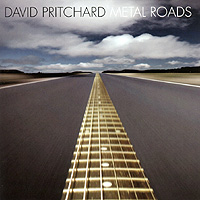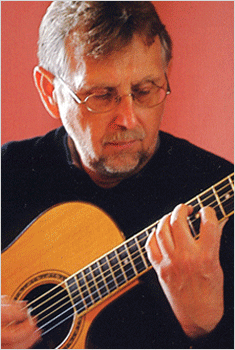 Great
guitarists don’t just turn up out of nowhere. Case in point,
guitarist David Pritchard released his Vertical
Eden CD back in 2008 and in 2010 he digs into his vaults for
the first ever CD reissue of his 1981 album Metal Roads. In
recent years, Pritchard has become famous for recording multiple acoustic
guitars-based instrumental music, but for Metal Roads the sound
is pure, late ‘70s / early ‘80s fusion music with one ear
turned towards American jazz rock and another towards the Euro centric
sounds coming from the continent back in the ‘70s. At seven plus
minutes, the CD closer “Nuclear Casino” sounds a little
like Bill Bruford’s band with Alan Holdsworth circa 1979, or
close enough! Produced by Pritchard and recorded in L.A., the Metal
Roads CD features eight cuts with Pritchard performing electric,
acoustic and classical guitars while backed up by some top players
of the day. Released for the first time in 2010, the Metal Roads
CD was superbly recorded and new mastering unveils a sonic sheen worth
hearing today. A genius of the acoustic guitar, and certainly well
worth a listen, Pritchard’s early electric guitar based fusion
sound is put into fresh perspective on the welcome reemergence of
Metal Roads.
Great
guitarists don’t just turn up out of nowhere. Case in point,
guitarist David Pritchard released his Vertical
Eden CD back in 2008 and in 2010 he digs into his vaults for
the first ever CD reissue of his 1981 album Metal Roads. In
recent years, Pritchard has become famous for recording multiple acoustic
guitars-based instrumental music, but for Metal Roads the sound
is pure, late ‘70s / early ‘80s fusion music with one ear
turned towards American jazz rock and another towards the Euro centric
sounds coming from the continent back in the ‘70s. At seven plus
minutes, the CD closer “Nuclear Casino” sounds a little
like Bill Bruford’s band with Alan Holdsworth circa 1979, or
close enough! Produced by Pritchard and recorded in L.A., the Metal
Roads CD features eight cuts with Pritchard performing electric,
acoustic and classical guitars while backed up by some top players
of the day. Released for the first time in 2010, the Metal Roads
CD was superbly recorded and new mastering unveils a sonic sheen worth
hearing today. A genius of the acoustic guitar, and certainly well
worth a listen, Pritchard’s early electric guitar based fusion
sound is put into fresh perspective on the welcome reemergence of
Metal Roads.
MWE3.com speaks with DAVID PRITCHARD
about the CD release of Metal Roads
 MWE3:
How did you unearth the Metal Roads masters and why did you
decide to release it on CD now? What was involved in getting the album
onto CD and can you give a brief history on the making of the Metal
Roads album?
MWE3:
How did you unearth the Metal Roads masters and why did you
decide to release it on CD now? What was involved in getting the album
onto CD and can you give a brief history on the making of the Metal
Roads album?
DAVID PRITCHARD: Metal Roads was a project for which
I could never quite find the right timing or resources to release
it until now. I had changed my musical direction to playing primarily
acoustic guitar and writing non-improvised music for multiple acoustics
so I wasn’t compelled to present myself in the jazz/rock arena
anymore. But after some urging from several friends that were big
Metal Roads fans, I finally decided to release it now. Another
consideration was to finally get my whole catalog of recordings out
there. I had two technical issues in terms of getting the original
analog tape onto a CD. First, as is commonly done with old tapes,
I had to have it baked prior to digital mastering in order to re-laminate
the backing; that was done in 2000. But then, when I went to get it
manufactured earlier this year, the master CDR had deteriorated and
was unusable. Fortunately, I had made a couple of CDR transfers which
were still good. I began to think I was being punished for waiting
so long to release it!
MWE3: To my ears the sound of Metal Roads is very late '70s
kind of fusion jazz-rock influenced. On reflection, what was your
musical mind set and mission on the Metal Roads album and how
would you compare that album with some of your other earlier recordings?
DP: I was fortunate to be able to put together a group even though
we never worked much outside of preparing for the recording. Members
of the band were the great vibist Lynn Blessing, who tragically died
in 1994, bassist Steve Anderson, one of the most inventive bassists
I have ever worked with, Michael Jochum, a superb drummer who has
worked in recent years with Jackson Browne and Korn. and finally pianist
Rich Eames, a top LA freelancer. The album was recorded almost completely
live, with very little overdubbing; the tracks are basically all first
takes. We took two days to record and one day to mix.
Around the time of Metal Roads I was starting to listen to
a lot of contemporary classical music: the minimalist pioneers Steve
Reich and Philip Glass, as well as the twentieth century French composer
Olivier Messiaen. A couple of the tunes on Metal Roads have
references to his masterwork “Quartet For The End Of Time”
which he wrote in a World War II POW camp. Steve Reich’s use
of rhythmic counterpoints, phasing, and propulsive groove particularly
inspired me to try a similar concept within a jazz improvising context.
I also was really getting into arpeggiated chords and all their possibilities,
particularly rhythmic. I was also into odd time signatures and utilized
them widely, having been a Zappa and Mahavishnu fan. Compared to my
earlier jazz/fusion work, I think Metal Roads was more experimental,
a transition project which has ultimately led me to my writing of
music with no blowing sections and concentrating on acoustic and classical
guitars. Another factor was that I was tiring of the whole jazz scene,
which with a few exceptions, seemed to have become a less creative
and inspiring musical genre for me after the excitement and innovation
of the late sixties.
MWE3: Can you say something about your 1970's session work with Gary
Burton, Freddie Hubbard and Patrice Rushen from back then?
DP: I never officially recorded with Gary Burton, although a bootleg
album called Very Touchy, with me on it along with Steve Swallow
and Bill Goodwin, appeared in the late seventies. I sounded pretty
raw but then one has to consider that I was barely twenty years old
and pretty green to be playing with a big time jazz group. Needless
to say, playing with Gary was a real learning experience. For a guitarist,
working with Gary has to be one of the best gigs ever and there certainly
have been a number of significant players that have worked with him
over the years. Freddie Hubbard and Patrice Rushen played on my second
album City Dreams. Freddie did his part overdubbed and did
his best take before he’d even looked at the music! Patrice was
a dream to work with. She was only supposed to do one tune but ended
up doing the entire album. Certainly she is one of the best musicians
I have ever worked with and her solo on the track “Bright Depths”
from the City Dreams album is absolutely breathtaking!
MWE3: How would you compare the sound of Metal Roads with your
more recent approach to guitar instrumental music, especially in light
of your 2008 Vertical Eden CD and would you consider returning
to recording in a more rock based jazz style?
DP: As I mentioned earlier, Metal Roads is really a transition
project which ultimately led to my change of musical direction into
the acoustic realm starting in the late eighties. Nonetheless, Metal
Roads still has a freshness about it  and
I think it holds up quite well after nearly thirty years of being
in the can. It doesn’t neatly fit into any preconceived “style”
of jazz or jazz/rock playing. Although, maybe from a Luddite perspective,
I still prefer the simplicity, lack of gimmicks, and directness of
playing acoustic. However, I can’t say I will never again play
electric and a style of music similar to what I was doing on Metal
Roads. We’ll see if the opportunity arises and what happens
in the future. I do have a few post Metal Roads type compositions
that I never recorded and would love to do so at some point.
and
I think it holds up quite well after nearly thirty years of being
in the can. It doesn’t neatly fit into any preconceived “style”
of jazz or jazz/rock playing. Although, maybe from a Luddite perspective,
I still prefer the simplicity, lack of gimmicks, and directness of
playing acoustic. However, I can’t say I will never again play
electric and a style of music similar to what I was doing on Metal
Roads. We’ll see if the opportunity arises and what happens
in the future. I do have a few post Metal Roads type compositions
that I never recorded and would love to do so at some point.
MWE3: Can you say something about the guitars you featured on Metal
Roads compared to the guitars you've been featuring on some of
your recent recordings?
DP: On Metal Roads, I used an early seventies Les Paul Custom,
a Gallagher acoustic, and a classical guitar by Los Angeles luthier
Julius Gido. Of those instruments, the only one I still have is the
Les Paul. The acoustics I use now are a steel string by Ken Franklin
and a classical by Angel Benito Aguado.
www.MorphicResonanceMusic.com



